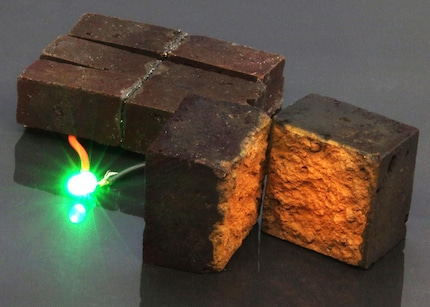
Electricity from bricks?
Red bricks can be used to build more than just houses: As electrodes, they can even supply small electrical devices with electricity, as researchers have now demonstrated.
Bricks are one of the most common building materials in the world: they have been used to construct buildings for thousands of years. Scientists led by Julio D'Arcy from Washington University in St. Louis have now succeeded in converting the red bricks into energy storage devices. Similar to a battery, their "smart bricks" can store enough electricity to power smaller devices such as an LED. The researchers demonstrate this in a proof-of-concept study, which they have now published in the scientific journal "Nature Communications".
"Our method works with normal or recycled bricks. But we can also make our own bricks," explains Julio D'Arcy in a press release from the university. For their prototype, the researchers simply used bricks that could be bought for a penny at the DIY store around the corner.

In order to transform the stones into so-called supercapacitors, D'Arcy and his colleagues first developed a coating of the electrically conductive polymer poly-3,4-ethylenedioxythiophene, or PEDOT for short. They then utilised the porous structure of the bricks and vaporised the coating onto the bricks to turn them into electrodes. The iron oxide contained in the brick is ultimately crucial for starting the polymerisation reaction.
Bricks as emergency lighting
An additional protective coating also makes the bricks waterproof and usable at temperatures from minus 20 to plus 60 degrees Celsius, the researchers write. According to their calculations, an entire wall made of such "smart bricks" could store a considerable amount of energy. D'Arcy and his team suggest, for example, combining the bricks with solar cells to power emergency lighting in a building for several hours. In this way, the space required by bricks could be utilised twice as efficiently.
Spectrum of science
We are a partner of Spektrum der Wissenschaft and want to make sound information more accessible to you. Follow Spektrum der Wissenschaft if you like the articles.
[[small:]]
Experts from science and research report on the latest findings in their fields – competent, authentic and comprehensible.
From the latest iPhone to the return of 80s fashion. The editorial team will help you make sense of it all.
Show all